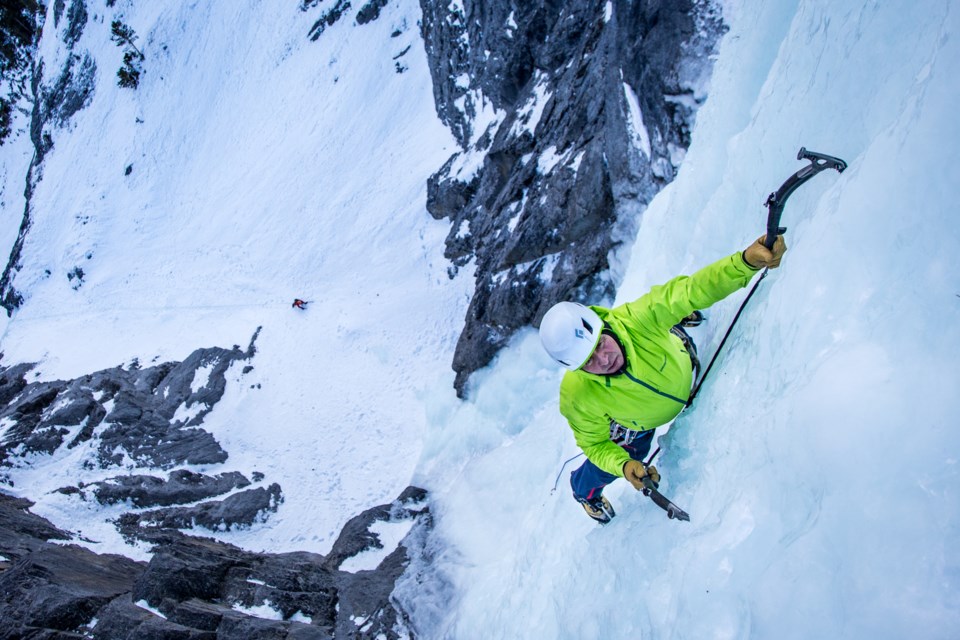BOW VALLEY – Mountain guide Barry Blanchard knows what it is like to experience trauma in the backcountry.
In 1986, while guiding four clients back from the summit of Mount Baker, his ice axe gave way while the group was descending and the entire group slid down the mountain and into a crevasse. Blanchard and two of his clients were partially buried, the other two were fully buried and did not survive.
He describes it as one of the blackest days of his life and in the aftermath of this traumatic experience, he struggled with his ability to cope with what happened and continue doing what he loved – guiding in the mountains.
A couple years ago, Blanchard said a serious incident that resulted in one of his friends breaking his ankle also affected him, but in both circumstances he sought help through a therapist.
"I just cannot imagine having been through a couple of very serious events like that, trying to deal with that on your own," he said.
One of the clinical psychologists that helped was Janet McLeod, with the Mountain Therapy Clinic in Canmore. Located in the same professional building as Yamnuska Mountain Adventures, McLeod has worked with a number of mountain guides after critical incidents in alpine settings.
Over the past year, Blanchard, McLeod, Sarah Hueniken, Todd Guyn and Kevin Hjertaas have been working towards establishing the Mountain Muskox mentorship and peer support program.
McLeod said they realized there was a need for a peer support system within the community for those who have experienced a critical incident while in the mountains, especially within a population of people who can be very self reliant.
"A lot of people are high achievers in this valley and it is not that common to ask for help," McLeod said. "I think it is amazing that Barry and this group are talking and normalizing the importance of the nervous system and to be able to prevent stress, or a critical incident, from overwhelming the nervous system."
Trauma has a direct effect on the nervous system. Post-traumatic stress disorder (PTSD) can be described as the way that trauma overwhelms the nervous system and affects a person's ability to function and process the emotions they are feeling.
McLeod said PTSD is not a weakness and that people can and do recover. Connecting to a greater social network of people who have experienced the same thing is one of the ways that recovery can be supported.
In a peer support setting, she said that trauma is carried by everyone in the group. Mountain guides are tasked with making decisions around risk taking quickly and accurately in an alpine setting, which can lead to them feeling they alone are responsible for the outcomes.
"When a critical incident occurs for a person, their whole world turns upside down," McLeod said. "I look at someone like Barry, or Todd Guyn, or Sarah Hueniken ... these people have such a depth of knowledge and they are so well respected in our community.
"How do we transfer this knowledge to other communities?"
Blanchard said mountain guides who experience a fatal incident are at risk of negative mental health outcomes. Within the community, he has known of at least one who ended up taking their own life as a result of the post-traumatic stress that comes with these types of situations.
"Trying to carry that weight by yourself, I think, is unimaginable," he said.
The Mountain Muskox peer support pilot project will see a group of 12 people from the mountaineering community engage in regular group and individual coaching sessions with McLeod and facilitator Stafford Perry.
The goal is to teach participants to practise and integrate what they are learning into their daily lives. By the end of the pilot, participants will be able to facilitate group exercises and become future facilitators for the program.
One of the goals is to create a template that can be used in other mountain communities to build a network of Mountain Muskox programs.
The initial pilot group will not only be participants and receive support and skills to cope with traumatic experiences, but will help inform the development of the program.
"This is a co-creation project," McLeod said. "We will be asking questions about what works and what does not work and we hope to be able to tap into each person's wisdom and intelligence.
"It is really about trying to find out what works for the community."
She said this is a process that cannot be rushed. The peer support model they are creating must be a generous space and create a place of safety for participants to share their grief and experiences.
While there are other professions that have peer support models, like firefighters for example, to deal with the types of trauma experienced on the job, McLeod said mountaineering has its own culture and an approach is needed to create a support system specific to those experiences.
"Frankly, I think there is space for real innovation and creation coming from the participants," she said.
The group is reaching out to the community for financial support to run the pilot and develop the program. Contributions to support the Mountain Muskox fund can be make through the Alpine Club of Canada, which can issue tax receipts as a charitable foundation.
The budget for the first two, three-month semesters is $42,160. The setup costs include design work, paying the professional clinicians for their time, as well as setting up and maintaining a website.
Go to www.mountainmuskox.com for more information.




